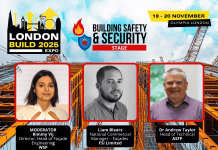Hugh Simpson, chief executive and registrar of the Architects Registration Board, discusses the revision of the Architects Code of Conduct & Practice to ensure it continues to hold the profession to the highest standards of integrity
Like other professions in the built environment, architects are expected to uphold a Code of Conduct and Practice. As the statutory regulator for the architect’s profession, the Architects Registration Board (ARB) has the responsibility for setting that Code and for taking action when serious or persistent failures to meet the Code are identified.
We are currently reviewing the Code, with a view to making sure that it continues to be fit for purpose and speaks to the specific challenges that today’s architects face.
The most recent edition of the Architects Code of Conduct & Practice was published in January 2017, and the world has changed hugely since that time. Architects today must contend with the legacy of Grenfell, the climate emergency and a greater awareness of, and desire to, eliminate structural inequalities in our society.
Key questions for ARB are how factors such as these should shape a revised version of the Code and how an updated version can drive positive behaviour and competent practice and enable the public to retain confidence in the profession as a whole.
At ARB, we don’t see the Code as solely a statement of our requirements; we see it as a shared agreement on what the professional standards of all architects must be, between us as the regulator, the profession and the public.
But what are the expectations of the public in relation to professionalism generally, and of the competencies that architects should have?
To answer these questions, we commissioned a piece of independent research from the independent research agency, Thinks Insight & Strategy.
This piece of research set out to investigate:
- The perceptions that members of the public and small-scale clients have of architects, and the qualities and standards they expect of them.
- What it means to be a professional in architecture.
- The public’s views of the standards expected of architects in relation to safety, sustainability, ethics and equality, diversity and inclusion (EDI).
The research focused on two groups: small-scale clients and users of public space. We wanted to start with these two groups as roughly half of all architects work with small-scale clients, and approximately 90% of members of the public can be classified as users of public space.
The research showed that architects are not front of mind for the public, even when they are prompted to think about who designs the spaces they use.
This reinforces the important role of professional regulators (and chartered bodies where independent statutory regulation is not in place) in ensuring that the standards of professionals reflect public needs and expectations.
When asked about the thing that was important to them when thinking about registered professionals, 20% of the public chose the option “they have a Code of Conduct which sets out how they must behave”. But having a Code is meaningless unless its content is relevant, it has influence (directly or indirectly) within the profession, and it is enforced.
Safety, Sustainability, Ethics and EDI
The feedback from respondents provides some helpful insights for us and for architects, but arguably the findings are relevant for all professions working in the built environment.
Small-scale clients tended to focus on practical questions including transparency around costs. Users of public space tended to focus on social concerns.
However, they were often united on the questions asked in relation to four key themes investigated as part of the research: Safety, Sustainability, Ethics and EDI.
Perhaps unsurprisingly, the research found that the public believe architects have a responsibility to make sure that buildings are designed safely and that guidelines should be in place for them to work from to ensure safety.
Other findings were around the need for clear lines of accountability for decisions in relation to safety and sustainability. Broader issues around behaviours were prominent in the research, including the importance of communicating effectively.
Poor communication is often a common factor in ARB’s professional conduct committee cases.
The research has given some interesting and important insight into the perceptions of the public, but we are keen to engage more widely and in particular with other professionals and organisations in the built environment.
Although we still await the publication of the Grenfell Tower Inquiry Report, we already know from Dame Judith Hackitt’s report on Building a Safer Future the critical importance, both in terms of quality and safety, of professions and contractors working collaboratively and with much clearer accountability.
When we consult on the new Code later this year, we must find ways of engaging all key interest groups in the built environment. At ARB, we work hard to build positive engagement with groups such as the RTPI and RICS, as well as cross-industry groups such as CIC and organisations representing building control.
The expectation of government and of the public is that there should be competence across professionals within the built environment and that opportunities to find consistency will be well received. Our intention is to publish a draft Code alongside a consultation later this year, and we hope to publish the finalised version of the new Code early next year.
The current version of the ARB Code was published just six months before the Grenfell Tower fire on 14 June 2017. To quote WB Yeats, “things are changed, changed utterly”. Or at least things should be changed, changed utterly, and a new Code will be part of ARB’s contribution to that change.
Hugh Simpson
Chief executive and registrar
Architects Registration Board
Tel: +44 (0)20 7580 5861














